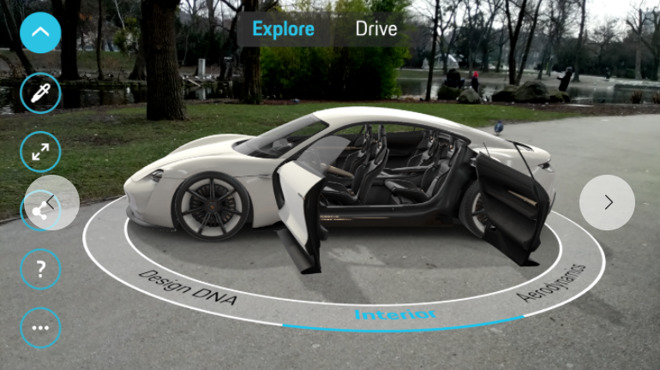Google brings ARCore out of beta, raising challenge to Apple's ARKit
Google has launched version 1.0 of its ARCore SDK, signaling the first real salvo in a fight with Apple for developer support in augmented reality.

Android developers are now free to publish ARCore apps to the Google Play Store, Google said. Currently the technology works on 13 different phones, including Google's Pixel products, Samsung's Galaxy S7 and S8 lines, the LG V30 and V30+, the ASUS Zenfone AR, and the OnePlus 5. Companies like Huawei, Motorola, Xiaomi, Nokia, ZTE, Sony, and Vivo will have compatible hardware later this year.
In contrast to its preview form, ARCore should now better situate objects in the environment, for instance allowing objects on textured surfaces. Similar improvements are coming to Apple's ARKit 1.5, due alongside this spring's iOS 11.3.
Google has partnered with several companies to produce early showcases. Snap, for instance, has recreated FC Barcelona's Camp Nou stadium in Snapchat, and a Porsche app lets people explore the automaker's Mission E concept.
Alongside ARCore, improvements have also been made to a platform still in preview, Google Lens. In the next few weeks the search technology will be available to every English-language user of Google Photos, including people with the iPhone and iPad app. Users can now select text in images, and create contacts and events in a single tap. In the near future the app will be able to recognize some plants and animals, such as different dog breeds.
Apple is increasingly making AR a tentpole feature. The iPhone 8 and X were designed with it in mind, and the company is rumored to be developing an AR headset for release in 2020 or later. The device could be fully independent, and controlled through a mix of Siri, head gestures, and touch commands.

Android developers are now free to publish ARCore apps to the Google Play Store, Google said. Currently the technology works on 13 different phones, including Google's Pixel products, Samsung's Galaxy S7 and S8 lines, the LG V30 and V30+, the ASUS Zenfone AR, and the OnePlus 5. Companies like Huawei, Motorola, Xiaomi, Nokia, ZTE, Sony, and Vivo will have compatible hardware later this year.
In contrast to its preview form, ARCore should now better situate objects in the environment, for instance allowing objects on textured surfaces. Similar improvements are coming to Apple's ARKit 1.5, due alongside this spring's iOS 11.3.
Google has partnered with several companies to produce early showcases. Snap, for instance, has recreated FC Barcelona's Camp Nou stadium in Snapchat, and a Porsche app lets people explore the automaker's Mission E concept.
Alongside ARCore, improvements have also been made to a platform still in preview, Google Lens. In the next few weeks the search technology will be available to every English-language user of Google Photos, including people with the iPhone and iPad app. Users can now select text in images, and create contacts and events in a single tap. In the near future the app will be able to recognize some plants and animals, such as different dog breeds.
Apple is increasingly making AR a tentpole feature. The iPhone 8 and X were designed with it in mind, and the company is rumored to be developing an AR headset for release in 2020 or later. The device could be fully independent, and controlled through a mix of Siri, head gestures, and touch commands.

Comments
100 million. That’s how many devices can run ARCore. Quite pathetic that all those devices combined total 100 million. Looks like Google might have accidentally leaked sales numbers.
Meanwhile, ARKit is likely getting close to 500 million.
https://www.bloomberg.com/news/features/2018-02-21/nobody-wants-to-let-google-win-the-war-for-maps-all-over-again
So, taking rumors and treating them as fact?
Here’s a few actual facts for you:
- Developers favor iOS over Android. Even now in 2018.
- There are far more iPhones in use around the world than there are Android flagships of similar power. By several times over.
- iOS users generate an average of 4X as much revenue for developers as the average Android user does.
Doesnt matter who’s “in it for the long haul”. History has shown iOS excels over Android for high-end or complex Apps. Developers aren’t going to waste their time building an App for a platform where there’s little chance of getting their money back.
Even tho you would assume the Apple platform would be far out in front of home control with HomeKit considering all their capable devices and a relatively unified platform, they're still coming up from the rear. Same with Siri. ARKit so far isn't attracting excitement either. It doesn't mean it won't, but other mobile AR platforms aren't exactly behind at this point.
Ah, so now you're deflecting by bringing up HomeKit and Siri. Good try. A for effort.
Whether AR takes off or not, it's obvious which platform will be the leader. And it's not the fragmented one with 1/4 the revenues and a spattering of devices that are capable of doing it.
It is interesting to consider whether AR, in the long haul, will be limited to the sense of sight... There could be new possibilities for AR that appeal to other senses such as hearing, feeling, smelling, tasting, etc.